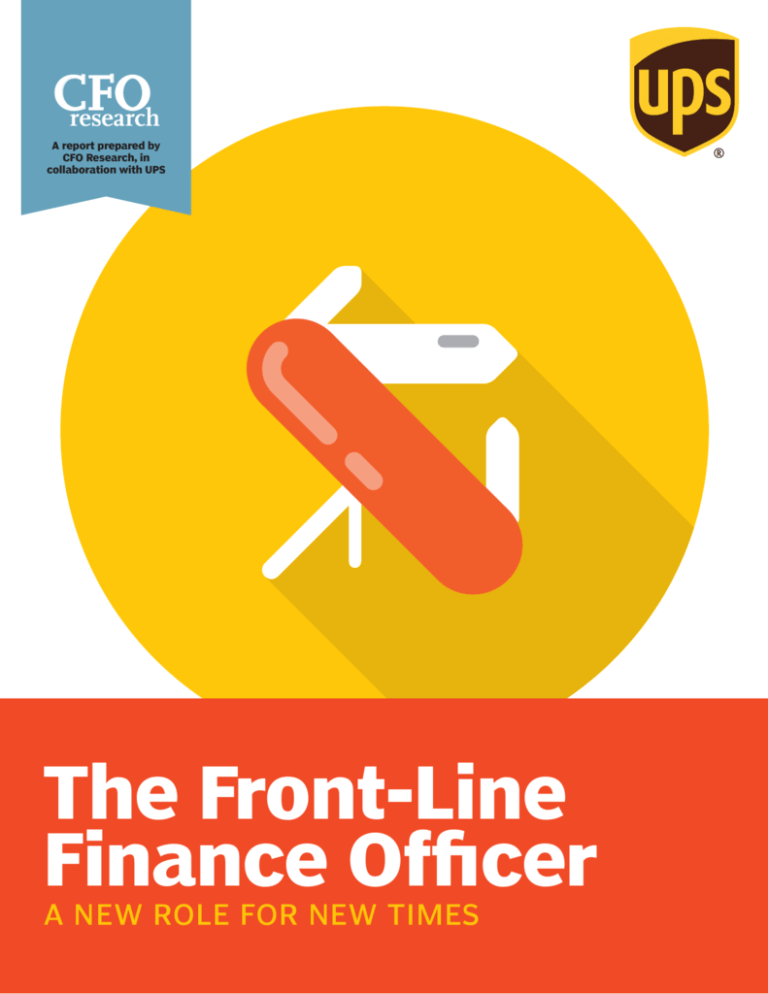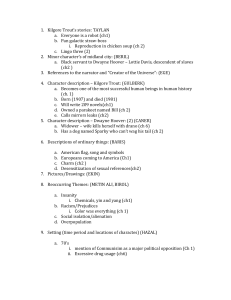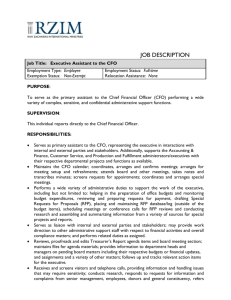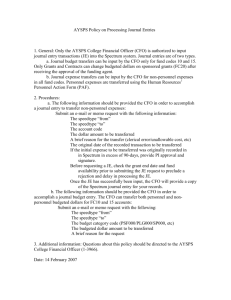
CFO
research
A report prepared by
CFO Research, in
collaboration with UPS
The Front-Line
Finance Officer
A New Role for New Times
Contents
About this Report
3
Executive Summary
4
A Time of Change and Growth for Professional Services
5
The Finance Officer as a Partner in Growth
7
Seeking Profitable Growth and Higher Value from Finance Teams
10
Sponsor’s Perspective: UPS
14
The Front-Line
Flexible Finance
Finance
Officer
Officer
2
About this Report
In the second half of 2014, CFO Research, in collaboration with UPS, fielded an online survey of senior finance
executives at U.S. companies in professional services
industries.
This research explores the way that finance roles are
changing at professional services firms, and in particular
what kind of leadership these companies seek from their
senior finance officers.
We received 161 complete responses to our survey. Survey
respondents represent a range of titles and companies, as
follows:
Title
Chief financial officer
37%
Controller16%
Director of finance
12%
Executive vice president or senior
vice president of finance
8%
Vice president of finance
8%
Senior finance manager
6%
Owner, partner, or principal
3%
Chief executive officer, president,
or managing director
3%
Treasurer1%
Director of financial planning and
analysis
1%
Other senior executive with
finance responsibilities 4%
Other1%
Revenue
$10 million-$50 million
32%
$50 million-$100 million
14%
$100 million-$250 million
10%
$250 million-$500 million
12%
$500 million-$1 billion
6%
$1 billion-$5 billion
8%
$5 billion-$10 billion
3%
More than $10 billion
16%
Employees
Fewer than 100
20%
100–50037%
500–1,0008%
1,000–5,00012%
5,000–10,0004%
More than 10,000
18%
Industry
Accounting/Auditing/Tax5%
Advertising/Public relations
6%
Architecture1%
Banking/Financial services
31%
Consulting10%
Engineering4%
Insurance13%
Legal services
3%
Real estate
7%
Research3%
Other professional, financial, or
business services
14%
Other3%
Note: Percentages may not total 100% due to rounding.
The Front-Line
Flexible Finance
Finance
Officer
Officer
3
Executive Summary
Yesterday’s small professional services firms are quickly
becoming the growth companies of today, and their
challenge is to make sure that growth is as profitable
as it is sustained. Finance leaders at these professional
services firms are changing as their companies change,
often becoming key members of company leadership
teams. In the professional services firm of tomorrow,
the full finance function, too, will be asked to evolve
and change—facing the challenge and the opportunity
of adapting its skills and experience to help guide the
firm’s strategy and vision. The functionality of finance is
evolving from a single-purpose tool to a Swiss Army knife
of business-critical, growth-supporting activities.
In a recent survey of finance executives at mid-sized
professional services firms, conducted by CFO Research
in collaboration with UPS, we found that many of the 161
firms responding were growth-oriented, with three-quarters
(77%) having seen their revenue surge over the past five
years, and even more (83%) having seen their number
of client engagements grow. The numbers of revenuegenerating staff at professional services firms have also
grown. However, some 43% of companies said their ratio
of administrative and support staff to professional staff has
declined during this same time period.
current 26%—and less time on routine transactional and
administrative tasks—17% versus the current 27%.
Of course, changing behaviors to deliver that additional
value is a challenge in its own right, but eight out of ten
survey respondents agreed that, if their firms improved
the use of technology and automation, they would be able
to spend less time on administrative tasks (freeing up
time for more value-adding tasks).
A finance officer who wants to be forward-thinking
should be searching for ways in which the finance team
can be part of the solution. One executive writes in the
survey: “[The CFO] needs to be a strong advocate for
growth strategies and a change agent.”
Survey respondents also said that they need their finance
leaders to take on more strategic roles, and to serve
as catalysts for change, working across their firms to
expand finance’s sphere of influence. Only a handful of
respondents still believe that the finance officer’s highest
value comes from traditional responsibilities such as
billing, cost control, or compliance.
A finance director in banking notes that this trend reflects
the new mandate for his company and his finance function:
“To become a leaner organization, with less overhead and
more dollars allocated to front-line activities.”
Of course, new roles for finance staff and finance officers
require new skill sets. The CFO of an engineering firm
writes: “The finance officer must be flexible. There are
not a lot of black-and-white rules anymore. Get out of the
office and meet clients to understand their needs. Do the
same with staff. And teach, teach, teach.”
Finance as a Growth Partner
In order to keep revenue-generating staff focused on serving
clients, finance team members at many firms have been
asked to step closer to the front lines of the business. They
are being asked to provide more analytical and process
support that can directly help the business grow.
The controller of a real estate firm writes that, in pursuit
of investment opportunities, his company will be “trying
new avenues.” A finance team that wants to successfully
partner across the firm will find itself going down these
“new avenues” side by side with the commercial drivers
of the business, led by an increasingly strategic CFO.
The survey confirms that finance leaders recognize the
opportunity they have to draw on the skills, knowledge,
and data resident in the finance organization. Respondents
believe their companies’ finance teams need to spend more
time on financial analysis—36% of their time versus the
In sum, it is time for finance leaders, and the finance
team, to look up from their spreadsheets and become
actively engaged with client-serving professionals,
sharing the imperative of adding value to clients and
supporting firm growth.
The Front-Line
Flexible Finance
Finance
Officer
Officer
4
A Time of Change
and Growth for
Professional Services
In the field of professional services, yesterday’s small
firms are quickly becoming the growth companies of
today. Whether it’s an accounting firm, a law office, an
architecture and engineering design partnership, or a
consultancy, these companies are turning their backs on
the economic downturn and ambitiously seeking new
pathways to growth.
Finance officers are
making themselves
into key members of
leadership teams.
As professional services firms adapt their old commercial
models to the new times, the demands on their professional
staff increase. Traditional models that required an individual to make all decisions on his or her own are giving way to
a more collaborative culture. Now, a firm is more likely to
expect to draw on the strengths of different team members,
working together in a networked environment.
More and more, the finance officers at these kinds of
firms are making themselves into key members of the
leadership teams. With growth comes change, and in
tomorrow’s services firm, the finance function will be
faced with the challenge—and the opportunity—of adapting their unique skills and experience more to making a
positive contribution to commercial growth and less to
simply tracking and reporting the numbers.
This shift is revealed in a recent survey of finance executives at mid-sized professional services firms in the
United States, conducted by CFO Research and sponsored by UPS. The research, which drew responses from
161 finance executives, underscores the necessity of stay-
The Front-Line Finance Officer
5
ing agile in the pursuit of new clients. For example, one
director of finance from the insurance industry makes the
case forcefully, writing that, for his company, the most
important thing is to “move with the times. Don’t stay put
in one place. We need to always be changing.”
Certainly, few of the companies in our survey can be said
to be standing still. Over the past five years, nearly all
the companies (83%) have seen their client engagements
surge, and nearly three out of ten finance executives
(28%) say that the number of client engagements is much
higher for their firms now than five years ago. Nearly
as many (77%) have seen their revenues grow, with 31%
reporting much higher growth. (See Figure 1.)
For a substantial number of respondents, this growth is
a direct result of mergers and acquisitions the professional services sector has undergone in recent years.
Thirty-seven percent (37%) of the finance executives
in the survey say that their companies are larger today
than five years ago due to merger activity.
And it’s not simply a case of the big fish gobbling up all
the little fish. The survey focused primarily on midmarket professional services firms, and nearly three out
of four companies report less than a billion dollars in
revenue; 56% are under $250 million. Consequently, the
merger activity we found suggests that these small and
mid-sized companies are combining with each other,
creating a greater whole out of relatively equal parts.
This, in itself, can make dealing with their corporate
growing pains even more difficult. Two firms with equal
but different cultures will have to negotiate how they
present themselves to their clients, how they conduct
their business, and how they work together in a collaborative way. Negotiations like these may be less likely when
a larger, dominant player enters the picture.
Figure 1. Following the economic downturn, mid-sized professional services firms are on
new paths to growth, as the number of client engagements and revenues both climb.
Compared to 5 years ago...
77%
report higher
revenue
One of the main points of discussion during a merger
or acquisition is who stays and who goes. To fuel its
growth ambitions, a services company will likely beef
up its professional staff—that is, increase the number of
employees who drive revenue. In fact, 83% of the firms
in the survey have more professionals today than they
did five years ago, and one in five (20%) have increased
professional staff at a faster rate than they have
increased revenues.
Front-line professionals are the drivers of growth, and
finance leaders recognize that talent management is
closely tied to financial performance. It’s for this reason
that the CFO of a full-design A&E (architecture and
The Front-Line Finance Officer
6
83%
report more client
engagements
engineering) firm notes that it will be most important
for his company to initiate “several focused tactical
objectives/projects related to retention, sourcing, talent
management and compensation.”
Finance leaders
recognize that talent
management is closely
tied to financial
performance.
The Finance Officer
as a Partner in Growth
What will it take to succeed in these times? A great many
things, according to the CFO of a healthcare software
company:
◗ “Develop new products / services. Use speed
and agility to our advantage. Anticipate changes
and adapt service offerings. Evaluate training and
development, culture, compensation and benefits
programs.”
This CFO, in fact, is emblematic of the change in the
finance culture and the scope of the finance leader’s
responsibilities that our survey points toward, whether
that’s the CFO or somebody with a different title. The
forward-thinking finance officer’s interests and responsibilities are extending across strategy, operations, sales,
talent acquisition and retention, professional development, and even such “soft skills” areas as corporate
culture and change management.
The ability to work
collaboratively, drawing
on the varied strengths
of different team
members, has never
been more highly valued.
These changes for the finance officer are in line with
the kinds of changes being seen throughout the professional services sector. Only one in five companies in
the survey (19%) still rely exclusively on individual
principals, partners, or practice leaders to make the
The Front-Line Finance Officer
7
commercial decisions at their companies. Almost six in
ten operate using a “corporate” model, with executive
or senior management teams taking responsibility for
financial performance. The remainder (23%) combine
the two management practices and strike a balance
between individual partners and corporate executives.
The ability to work collaboratively on engagements
and on strategy, drawing on the varied strengths of
different team members, has never been more highly
valued.
To become an integral part of the decision-making team,
many finance officers have been actively transforming
both their job descriptions and their colleagues’ perceptions of the value they deliver. In fact, eight out of every
ten respondents (79%) report that their senior finance
officers already have a strong voice in setting company
strategy. A CFO in financial services says that the senior
finance officer must “know the business from the ground
up,” while a CFO from a legal services firm insists that
value comes from maintaining “business focus, business
focus, business focus.”
At the same time, fewer than half of the respondents
in the survey (39%) view the senior finance officer at
their company primarily as a strategist—someone who
analyzes and interprets financial data to guide decision
making. Almost as many respondents (31%) report that
their finance leader still functions primarily in a more
traditional role as the steward of the company’s finances—overseeing assets, directing risk-management
efforts, and making sure the company meets its compliance obligations. (See Figure 2.)
In many firms today, finance teams want their leaders
to be more actively engaged in company strategy and
in working outside of their functional silos. Regardless of the finance officer’s current role, a majority of
Figure 2. Finance teams are eager for their leadership to take on higher-value roles within the
larger enterprise.
How would you describe your senior finance officer?
What do you believe your finance officer ideally should become more of?
Strategist
catalyst
steward
administrator
Analyzing and
interpreting financial
data to guide decision
making
Working with others
outside of finance to
spur changes in the
organization
Overseeing assets, directing
risk management, and meeting
compliance obligations
Managing back
office or support functions
currently
currently
currently
currently
Ideally
Ideally
Ideally
Ideally
39%
56%
18%
40%
31%
26%
11%
7%
Note: In the chart, “Ideally” responses do not total 100%, as respondents were allowed multiple selections.
respondents (56%) believe their finance leader needs
to become even more of a strategist.
The largest differences between the current state and
the ideal is seen in the role of catalyst—the CFO who
can work with others outside of finance to spur change
throughout the enterprise. Although only 18% of respondents currently see their senior finance officer as
a catalyst, 40% believe their finance officer should be
working on expanding finance’s sphere of influence by
acting more as a catalyst for change.
Among the firms led at least partially by partners or principals, the senior finance officer is nearly as likely to be
a partner/principal as not. But at firms where the senior
finance officer is not a partner, respondents are much
more likely to indicate that the finance officer is primarily
The Front-Line Finance Officer
8
a “steward of the company’s finances” (40%) than they
are to say the finance officer is either a strategist (25%)
or a catalyst (17%). The walls of the finance silo are likely
still intact at these companies.
In many firms today,
finance teams want
their leaders to be more
actively engaged in
company strategy and in
working outside of their
functional silos.
Only a handful of respondents believe that the senior
finance officer’s value still comes from what may be seen
as traditional finance responsibilities, such as billing, cost
control, or compliance, or from improving financial metrics alone. When asked about the most important things
their company’s senior finance officer can do to optimize
his or her value to the company, many respondents cite
various ways the finance officer can support operations
and promote business growth, including working closely
with other executives to provide guidance and analyses
supporting management decision making:
◗ “The CFO at our company needs to be a strong
advocate for growth strategies and a change agent
to implement and optimize technology to make
finance and operational processes more efficient.
The CFO also needs to be able to evaluate
acquisitions and perform financial analysis
to enlighten and guide intelligent business
decisions.”
—CFO, consulting firm
◗ “[The finance officer needs] effective strategic
planning, a strong management process that is
transparent and drives accountability, [and] works
effectively with other senior management and
others inside and outside the company.”
—CFO, insurance firm
◗ “Continue to analyze and effectively make
decisions that will move the company in a
direction that will generate profitable growth
efficiently.”
—CFO, electronic security services firm
◗ “Detect trends within the company to avoid
train wrecks. Improve processes, policies, etc.
to ensure that growth (whether organic or via
acquisition) is not hindered.”
— Controller, professional services firm
The Front-Line Finance Officer
9
“There are not a lot of
black-and-white rules
anymore.”
Ultimately, writes the CFO of an engineering firm:
◗ “The finance officer must be flexible. There are
not a lot of black-and-white rules anymore. He
or she must also understand the operations side
of the company. Get out of the office and meet
clients to understand their needs. Do the same
with staff. And, teach, teach, teach. Make sure
that your associates understand why you need to
hit certain metrics; don’t just tell them that they
have to do it.”
Seeking Profitable Growth and
Higher Value from Finance Teams
Having survived the recent recession, the companies still
standing are understandably reluctant to start throwing
cash around again—on salaries or anything else—even
as they pursue their newly developing opportunities.
Business leaders are laying plans to grow again, but the
focus is more intense than ever on profitable growth.
These days, the focus is
more intense than ever
on profitable growth.
To meet the challenges of increasing competition and
uncertain markets, many finance executives in the survey
point to the “need to become a leaner organization, with
less overhead and more dollars allocated to front-line
activities,” as a director of finance from the banking/
financial services industry writes. Simply put, the
task for a mid-sized professional services firm now
is “maximizing volume on thinner profit margins,”
according to a CFO from the financial services sector.
For these companies, adding administrative and support
staff to keep pace with growth is not going to be high on
the agenda. In fact, the professional services firms in our
survey are more likely to downsize their back offices than
to expand them. Professional staffs are growing faster
than support staffs; 40% of firms have seen declines in the
ratio of administrative and support staff per professional,
at a time when, for the most part, they have been adding
professional staff. (See Figure 3.)
This leaves many firms juggling revenue generation with
the need simply to get things done. A quarter of respondents (26%) say that their companies would benefit greatly
by reducing the amount of time professionals spend on
Figure 3. The mandate for profitable growth is leading to a decreasing number of support staff.
Over the past 5 years...
40%
say the ratio of support
staff to professional
staff has DECREASED
The Front-Line Finance Officer
10
Figure 4. The professional
staff at services firms need
to be able to focus on the
reason they are there—
generating revenue.
70%
feel their company would
benefit from reducing
the amount of time
professionals spend on
administrative
tasks
administrative tasks, and another 44% say their companies
would benefit at least somewhat. (See Figure 4.) Keeping
professional staff focused on actually generating revenue is
becoming increasing difficult in a do-it-yourself world.
Finance teams are also facing increasing demands to
focus their expertise on higher-value activities. Survey
respondents report that finance function time now is split
evenly between financial analysis to support business
development and growth (26% of the finance function’s
time) and transactional and administrative tasks (27% of its
time). On average, however, finance executives believe their
teams need to be spending more time on financial analysis
(36% of their time) and less on routine transactional and
administrative tasks (17% of their time). (See Figure 5.)
Eight of every ten respondents agree that, if their firms
improved the use of technology and automation, they
would be able to spend less time on administrative tasks.
(See Figure 4.) Certainly, in a firm where professionals are
expected to drive more growth with fewer support staff, the
finance function can play an important role in employing
technology and automation to ensure that the business and
transactional processes critical to a company’s execution
of its business are well-oiled and running smoothly. (See
sidebar, “Keeping Documents on Track.”)
The Front-Line Finance Officer
11
81%
feel improving their
use of technology
and automation
would allow them to
spend less time on
administrative
tasks
If that goal can be achieved, then finance employees will
find that more of their own time can be freed up to work
with the commercial side of the business. In particular,
they can do more to contribute to the firm’s strategic goals,
providing financial analysis and insight in evaluating new
opportunities, gauging the firm’s progress, and helping
redirect resources to where they will do the most good.
Finance teams are facing
increasing demands to
focus their expertise on
higher-value activities.
When the controller of a real estate firm writes that one
of the main challenges for his company over the next two
years will be “finding new investment opportunities,”
he also acknowledges that, to do so, the company must
necessarily be “trying new avenues.” Any finance team
that wants to be a full partner in the solution will also
find itself going down these “new avenues,” side by side
with the commercial drivers of their business and led by
their newly minted strategic CFO.
Figure 5. Finance teams are looking to spend more time adding value to the business, and less
time on purely administrative tasks.
How should your company’s finance function spend its time?
-9%
difference in how
time should ideally be
spent on transactional
and administrative
tasks
+10%
difference in how time
should ideally be spent on
financial analysis to
support business
development and
growth
Currently
n
n
n
n
n
n
Financial analysis to support business development and growth
T
ransactional and administrative tasks (e.g., expense tracking, billing, payables)
Compliance and reporting
Risk analysis and management
Mergers and aquisitions (M&A) activities
Cost control for the company
The Front-Line Finance Officer
12
Ideally
Keeping Documents on Track
In another sign of the changing times, professional services
firms have been steadily reducing the stacks of paper that
historically drive their businesses, turning increasingly to
electronic communica­tions with clients. Nearly two-thirds
of respondents (64%) note that more of their client-related
documentation these days is electronic than paper.
Despite this trend, most respondents (82%) still use
overnight shipping services at least once a week, and
more than half (53%) make one or more shipments each
business day. Reliability is by far the most important
consideration when using an overnight or express
shipping service. Reliability receives an average of 51
points out of 100, when finance executives rate the
features they value in an overnight shipping service. The
next most important consideration, price, receives an
average of 17.5 points out of 100.
With overnight shipping remaining as frequent a necessity as it is for the professional services firm, the consci-
entious CFO needs to keep a close eye on who is using
these services, how often, and who is paying for them.
Whether project expenses are being billed back to the
client, or project leaders need to manage their individual
P&L’s, the ability to track and allocate expenses remains
an important part of the finance function’s duties.
Most of the companies in our survey acknowledge
this reality, and only 15% of them don’t track shipping
expenses separately. For the 85% that do, the volume of
small, individual daily and weekly transactions can tax
the limited time and resources of a mid-sized company’s
finance team.
In our survey, approximately the same number of
respondents rely on manual or spreadsheet-based
processes to track shipping expenses (27%) as have fully
automated systems (24%). All too often, the finance team
must commit time and resources to collecting, sorting,
and reporting data and manually reconciling invoices,
when their data management and analytical skills could
be better applied to adding value to client engagements.
Use of Express Shipping Services
at Professional Services Firms
53%
One or more shipments daily
29%
One or more shipments weekly
9%
A few times a month
9%
Other
The Front-Line Finance Officer
13
Sponsor’s Perspective
Finance leaders who took part in the 2014 CFO Survey
– “The Front-Line Finance Officer: A New Role for New
Times” – confirmed that their roles are changing quickly.
Several areas of opportunity emerged as ways to lead
their firms toward a more profitable future. Now the
question becomes, how can the CFO make it happen?
One way is to partner with experts who not only share
your business vision and aspirations, but who’ve been
planning and strategizing to help you realize them. You
may know UPS as the express delivery company that
delivers to more U.S. businesses and ZIP Codes by 8:00
a.m. and 10:30 a.m. than FedEx. However, you might be
surprised by the range of benefits we offer beyond fast
and reliable transportation. For example:
Reinforcing your brand: In a world dominated
by electronic communications, you should not
underestimate “old school” marketing. Consider the
favorable impact of your brand and logo prominently
displayed on the express envelopes that carry your
proposals, contracts, client pitches, or work products.
UPS can customize your overnight delivery envelopes
to do just that. It’s a smart, simple and repeatable way
to make the most of an express envelope to keep your
brand top of mind with clients and to help gain new
ones as well.
Boosting productivity of your professionals: Eight of
ten participants in the CFO Survey cited the importance
of adopting technology to help front-line professionals
focus more time on driving revenue. While you once had
one administrative staffer for every two professionals,
you may now have only two for the entire firm. With
fewer support staff members, your professionals are
picking up administrative responsibilities. What if
they could easily take care of tasks like storing address
books, creating shipping labels, and efficiently allocating
shipping costs to your clients? UPS can help with easyto-use shipping technology enabling you to access your
MS Outlook contacts to make label creation simple, and
helping ensure that shipments are billed to the correct
client / matter codes.
The Front-Line Finance Officer
14
Digging new value out of familiar places: Is adding
staff costs in the mailroom a necessary burden to handle
increased volume? A better option to spur profitable growth
might be to increase mailroom efficiency by empowering
the people you have with a special-purpose, electronic
hand-held device to scan incoming packages (from any
carrier), create an internal routing label, deliver the package,
and capture signatures. Plus, you can use this device to
maintain an inventory of all equipment, from tables and
chairs to computer equipment, a feature that comes in
handy in a merger-and-acquisition environment.
Building your vital relationships: Who hasn’t sweated
over important contracts crossing the country or crossing
borders? What if your transportation partner offered
you a team to monitor such critical shipments and – if
a problem occurred – pulled out all the stops to find a
solution? That’s exactly what UPS Proactive Response®
Secure can do for you. While you sleep, UPS works to
monitor and intervene whenever a critical shipment is at
risk – whether the cause is foul weather or a mechanical
emergency on a flight. If an unavoidable delay is
identified, automatic insurance coverage, offered through
UPS Capital® Insurance Agency, Inc., kicks in to protect
you against the unforeseen costs of expedited delivery
and recovery procedures as well as consequential
damages should that contract not arrive on time.
These are just a few of many ways we can support and
fuel the aspirations of finance leaders expressed in
this CFO Survey. Sure, you knew UPS delivers more
guaranteed packages on time and around the world than
any other carrier, and now you know we deliver so much
more! Are you ready to get started? Let’s talk about how
you see your finance role evolving and fresh ideas to help
get you there.
Alex Ortolano
UPS Marketing Director
(404) 828-4745, or e-mail: aortolano@ups.com
Insurance is underwritten by an authorized insurance company and issued
through licensed insurance producers affiliated with UPS Capital Insurance Agency,
Inc. and other affiliated insurance agencies. Products are not available in all areas.
Check with your local representative for more information and for product availability.
Disclaimer:
The Front-Line Finance Officer: A New Role for New Times is published by CFO Publishing LLC, 51 Sleeper Street,
Boston, MA 02210. Please direct inquiries to Linda Klockner at (617) 790 3248 or lindaklockner@cfo.com.
CFO Research and UPS developed the hypotheses for this research jointly. UPS funded the research and publication of
our findings. At CFO Research, David W. Owens directed the research and wrote the report.
CFO Research is the sponsored research group within CFO Publishing LLC, which produces CFO magazine and CFO.com.
UPS, the UPS brandmark, and the color brown are registered trademarks of United Parcel Service of America, Inc.
November 2014
Copyright © 2014 CFO Publishing LLC, which is solely responsible for its content. All rights reserved.
No part of this report may be reproduced, stored in a retrieval system, or transmitted in any form, by any means,
without written permission.







![Physical Resource and Techincal Infrastr[...]](http://s3.studylib.net/store/data/006918141_1-99e89495d67677efc270a59fb0075a90-300x300.png)

